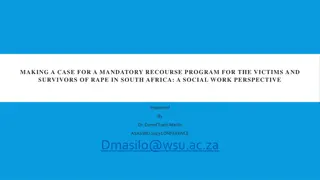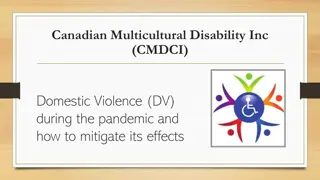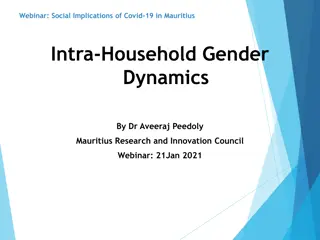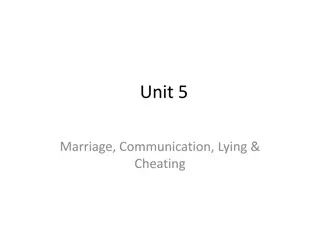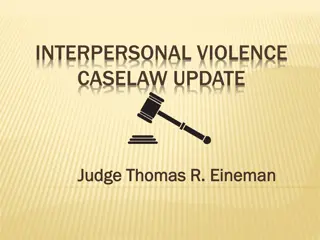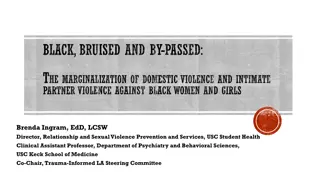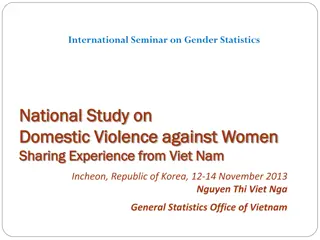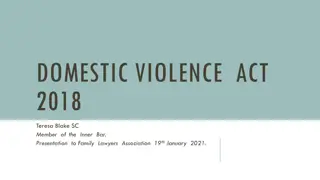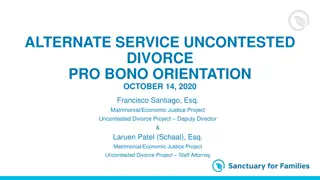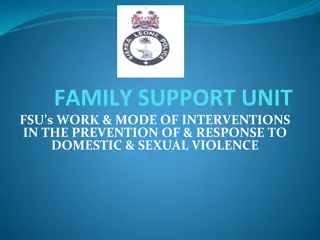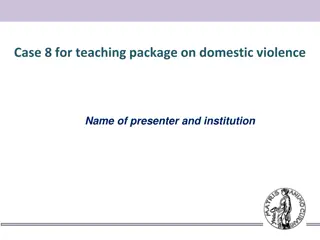Understanding Domestic Violence and Legal Recourse
The content provides a comprehensive overview of domestic violence, including its forms, victims, complainants, and legal provisions under the Protection of Women from Domestic Violence Act, 2005. It outlines the purpose of the act, defines domestic violence, describes its various forms such as physical, sexual, verbal, emotional, and economic violence, and explains the reliefs, facilities, penalties, and punishments available. The Act aims to protect women's rights and provides mechanisms for addressing violence within the family.
Download Presentation

Please find below an Image/Link to download the presentation.
The content on the website is provided AS IS for your information and personal use only. It may not be sold, licensed, or shared on other websites without obtaining consent from the author. Download presentation by click this link. If you encounter any issues during the download, it is possible that the publisher has removed the file from their server.
E N D
Presentation Transcript
CONTENT 1. PURPOSE OF THE ACT 2. WHAT IS DOMESTIC VIOLENCE? 3. FORMS OF DOMESTIC VIOLENCE 4. WHO IS THE VICTIM? 5. WHO CAN FILE A COMPLAINT? 6. AGAINST WHOM? 7. WHOM TO COMPLAIN? 8. HOW TO COMPLAIN? 9. WHEN TO COMPLAIN?
CONTENT 10. RELIEFS AVAILABLE UNDER THE ACT PROTECTION ORDER RESIDENCE ORDER MONETARY RELIEF CUSTODY ORDER COMPENSATION ORDER INTERIM AND EX PARTE ORDER 10. FACILITIES PROVIDED UNDER THE ACT 11. PENALTY/PUNISHMENTS UNDER THE ACT
PURPOSE OF THE ACT THE PURPOSE OF THE ACT IS TO PROVIDE FOR MORE EFFECTIVE PROTECTION OF THE RIGHTS OF WOMEN GUARANTEED UNDER THE CONSTITUTION WHO ARE VICTIMS OF VIOLENCE OF ANY KIND OCCURRING WITHIN THE FAMILY AND FOR MATTERS CONNECTED THEREWITH OR INCIDENTAL THERETO.
WHAT IS DOMESTIC VIOLENCE? (SECTION 3) SECTION 3 OF PROTECTION OFWOMEN FROM DOMESTIC VIOLENCEACT, 2005 provides: For the purposes of this act, any act, omission or commission or conduct of the respondent shall constitute domestic violence in case it (a) harms or injures or endangers the health, safety, life, limb or well-being, whether mental or physical, of the aggrieved person or tends to do so and includes causing physical abuse, sexual abuse, verbal and emotional abuse and economic abuse; or (b) harasses, harms, injures or endangers the aggrieved person with a view to coerce her or any other person related to her to meet any unlawful demand for any dowry or other property or valuable security; or (c) has the effect of threatening the aggrieved person or any person related to her by any conduct mentioned in clause (a) or clause (b); or (d) otherwise injures or causes harm, whether physical or mental, to the aggrieved person.
FORMS OF DOMESTIC VIOLENCE PHYSICAL VIOLENCE Beating, Kicking, Pushing, Causing bodily injury in any manner SEXUAL VIOLENCE Forced sexual intercourse, Forces you to look at pornography, Any sexual act that humiliates, degrades or violates your dignity VERBALAND EMOTIONALVIOLENCE Questions character, Insult for not bearing a boy, Ask for dowry, Preventing you or your child from attending any educational institution or place, Force to marry, Emotional blackmail, Harassment for Dowry ECONOMIC VIOLENCE Not giving money for basic needs, Prevent you from working, Take away your salary, Not paying rent, Throw you out of the house
WHO IS THE VICTIM? [AGGRIEVED PERSON-SECTION 2(a)] SECTION 2 (A) OF PROTECTION OF WOMEN FROM DOMESTIC VIOLENCE ACT, 2005 DEFINES: Aggrieved person as any woman who is, or has been, in a domestic relationship with the respondent and who alleges to have been subjected to any act of domestic violence by the respondent.
WHO IS THE ABUSER/PERPETRATOR? Any adult male person who is, or has been, in a domestic relationship with the aggrieved person and against whom the aggrieved person has sought any relief under this Act Also aggrieved wife or female living in a relationship in the nature of a marriage may also file a complaint against a relative of the husband or the male partner
WHO CAN FILE A COMPLAINT? Only A Women Can File A Complaint Under The Protection Of Women From Domestic Violence Act, 2005
AGAINST WHOM? Any adult male member who has been in a domestic relationship with the woman Relatives of the husband or the male partner Includes both male and female relatives of the male partner
WHOM TO COMPLAIN? PROTECTION OFFICER POLICE OFFICER SERVICE PROVIDER JUDICIAL MAGISTRATE OF FIRST CLASS METROPOLITAN MAGISTRATE
HOW TO COMPLAIN? Over Telephone/ E-mail to the Protection Officer/ Service Provider Written Complaint to Protection Officer, Police Officer, Service Provider, Magistrate
WHEN TO COMPLAIN? When the incident of domestic violence has happened When the incident of domestic violence is happening When there is a probability that it will happen
RELIEFS AVAILABLE UNDER THE ACT PROTECTION ORDER (SECTION 18) RESIDENCE ORDER (SECTION 19) MONETARY RELIEF (SECTION 20) CUSTODY ORDER (SECTION 21) COMPENSATION ORDER (SECTION 22) INTERIM AND EX PARTE ORDER (SECTION 23)
PROTECTION ORDER (SECTION 18) Prohibiting the Respondent from: Committing acts of violence Aiding and abetting in the commission of domestic violence Entering place of employment of food in case of a child Alienating assets, bank accounts, Stridhan or any property that they hold separately or jointly
RESIDENCE ORDER (SECTION 19) To remove the use of function and households Restraining the abuser from entering any portion of the household where the victim resides Direct the respondent to secure alternate accommodation Restrain the abuser from alienating or disposal off the shared household
MONETARY RELIEF (SECTION 20) Expenses incurred Losses suffered Medical expenses Maintenance for herself and children The Court can direct the employer or debtor of the respondent to make payment directly to the victim or deposit in court the amount ordered by the Magistrate
CUSTODY ORDER (SECTION 21) The Court can grant Custody of child or children to the aggrieved person in the pendency of any application Magistrate can deny visitation rights to the children to the respondent is such visit is harmful to the child
COMPENSATION ORDER (SECTION 22) In addition to any other reliefs magistrate may also grant compensation order for damages for injuries, including for mental torture and emotional distress caused by the act of domestic violence
INTERIM AND EX PARTE ORDER (SECTION 23) If the Magistrate is satisfied that the application discloses commission of an act of domestic violence he may grant and Ex Parte Order. Court can also pass Interim Orders if the matter is of urgent nature.
FACILITIES PROVIDED UNDER THE ACT MEDICAL FACILITIES (SECTION 7) SHELTER HOMES (SECTION 8) COUNSELING (SECTION 14) ASSISTANCE OF WELFARE EXPERTS (SECTION 15) SUPPORT BY PROTECTION OFFICER, POLICE OFFICER AND SERVICE PROVIDER (SECTION 4, 5, 8, 9 AND 10)
PROCEDURE An aggrieved person or a Protection Officer or any other person on behalf of the aggrieved person may present an application to the Magistrate seeking one or more reliefs under this Act Within three days of receipt of the application by the court, the first date of hearing is fixed Notice of the date of hearing shall be served to the respondent, within two days after receipt from the Magistrate, by the Protection Officer If required ex-parte orders or interim orders are passed The Magistrate shall endeavour to dispose off every application within 60 days of from the date of its first year There shall lie an appeal to the Court of Session within 30 days of the service of the order to any of the parties
PENALTY/PUNISHMENTS UNDER THE ACT The breach of Protection Order or Interim Protection order by the Respondent is cognizable and non-bailable. imprisonment for a term, which may extend to one year or with fine, which may extend to twenty thousand rupees or with both. He can also be tried for offences under section 498A of the Indian Penal Code 1860 or the Dowry Prohibition Act, 1961. FOR It is punishable with RESPONDENT (SECTION 31) If any Protection Officer fails or does not discharge his duties as directed by the Magistrate without any sufficient cause, he will be liable for having committed an offence under the Act with similar punishment. However, he cannot be penalised without the prior sanction of the State Government. Moreover, the law protects him for all actions taken by him in good faith. FOR PROTECTION OFFICER (SECTION 33)



